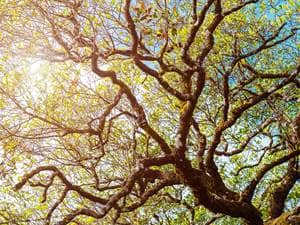
"I am the true vine, and my Father is the husbandman." (John 15:1)
The Last Supper, when Christ gave this parable to His apostles, was a crucial time. He was preparing to leave them—with responsibility for His Church. They needed to understand the relationship He and His Father would have with them as the essential vine and the husbandman guiding and overseeing their lives and their work.
Strong Vines and Branches
Of all the plants referred to in the Bible, grapevines appear most often. Grapevines were part of daily life in Christ's time, but many of today's readers need more details to visualize them in understanding the parable. Long vines on a short shrub connect with branches that require their support. Branches can produce grape clusters, but few grapes appear unless the gardener provides needed conditions and care. Branches that lose their connection with the essential vine will die.
Today varieties of vine-dwelling fruits are native to areas throughout the world: passion fruit to Central and South America, South Africa, and Pacific Islands; Kiwi to China, New Zealand, and California; Strawberries to climates more temperate; Blackberries to North America and Europe. These varieties are different colors and may within themselves have different colors.
Christians today freely apply this comparison to ourselves. To begin, we, like vine-dwelling fruits, live in many places and conditions that meet our needs specifically. Colors are external and don't interfere with our relationship to Jesus Christ and His Father.
Better Branches
"Every branch in me that beareth not fruit he taketh away: and every branch that beareth fruit, he purgest it, that it may bring forth more fruit." (verse 2)
Lazy branches produce little fruit. Necessary pruning, digging, and dunging probably aren't terribly pleasant; but plants need and flourish with this care.
We also need to endure loss, imbalance, and unpleasant tastes. As the gardener, the Father wants to make us the best we may become. People must be tried, trained, and developed. The Father does not do this to punish us or to keep us from experiencing joy, but to strengthen us and enable us to experience greater joy.
In his book The Problem of Pain, Christian writer C.S. Lewis wrote, “We can ignore even pleasure. But pain insists upon being attended to. God whispers to us in our pleasures, speaks in our conscience, but shouts in our pains: it is his megaphone to rouse a deaf world." Lewis continued, "Whether we like it or not, God intends to give us what we need not what we now think we want."
In a letter Lewis wrote to a clergyman friend, whose wife, like Lewis's wife, was dying of cancer, he expressed their feelings: "We are not necessarily doubting that God will do the best for us; we are wondering how painful the best will turn out to be."
Christian leader Anthony R. Temple offered consolation: "[God] knows us so completely and sees beyond what we see, so that He can purge, or prune and purify, us." Only through this process can we become more fruitful. Temple mentions forms of "pruning" we might need to endure: illness, disability or other physical limitation; expectations not fulfilled; relationships damaged; other forms of personal loss. He concluded that we become stronger if the trial "causes us to rely more on the Lord and to rethink our priorities. Such difficult experiences can make us more fruitful, or more like the Savior—our true vine."
Faith refined through trials "shows itself clearly to be genuine faith!" according to Blake Long, author of books on Christian living. He agrees with many Christian authors that "God is using the trial to push our Faith forward, to help it endure, to preserve it."
Tight Connections
Abide in me, and I in you. As the branch cannot bear fruit of itself, except it abide in the vine; no more can ye, except ye abide in me.
I am the vine, ye are the branches: He that abideth in me, and I in him, the same bringeth forth much fruit: for without me ye can do nothing.
If a man abide not in me, he is cast forth as a branch, and is withered; and men gather them, and cast them into the fire, and they are burned.
If ye abide in me, and my words abide in you, ye shall ask what ye will, and it shall be done unto you. (verses 4-7)
Our essential vine, Christ, "is the vine from which all life comes . . . He is indeed God as the Son," remarked Christian writer Bill Delvaux. Abide means to remain close. As the "true vine," Christ is the "central stalk rooted in the ground" to support and nourish the branches. If we study intently, Christ's words will abide in us. We must also pray often for His guidance. "Being connected to Jesus means that he is our all, and we are living for him."
Is this sacrifice? Christian scholar/leader Gerrit W. Gong assured, "As we follow Jesus Christ with real intent, we are strengthened in His love. Our desire increases to do justly, love mercy, and walk humbly with God." Certainly an abiding relationship.
Following Him with Intent requires that following His commandments and His teachings. We are commanded to love God and our fellow men and women; we must also sacrifice for others, forgive everyone (including enemies), and serve in our neighborhoods, communities, and congregations.
Jesus also asks us to reach out to others sharing our faith. We must remain humble, accepting the will of the Savior and the Father and recognizing how we depend on them, even when it is difficult.
The Savior gives us (as He gave His disciples) an all or nothing choice. Those who abide in Christ and His words will receive anything they ask to help them. Those who refuse to abide become disconnected branches, which the Father/Gardner discards to be burned. Fortunately, both the vine and the gardener give us plenty of second chances.
Abundant Fruit
Herein is my Father glorified, that ye bear much fruit; so shall ye be my disciples. As the Father hath loved me, so have I loved you: continue ye in my love. (verses 8-9)
By bearing fruit we glorify the Father and confirm our discipleship with the Savior.
Apostolic Fruits
As the essential vine, Christ intended for the branches to produce right away. After His resurrection–even as some of the 11 were still doubting–He joined them in a meal and sent them after fruit: "Go ye into all the world and preach the gospel to every creature." With this instruction from the vine, the branches "went forth and preached every where, the Lord working with them, and confirming the word with signs following (Mark 16: 15, 20).
Meeting the 11 at an appointed mountain in Galilee, He reminded them of the fruit. "Go ye therefore, and teach all nations . . . teaching them to observe all things whatsoever I have commanded you: and, lo, I am with you alway, even unto the end of the world" (Matthew 28:18-20).
Apostolic fruit continued. Acts is filled with accounts of Peter's sermons, healings, miracles, and other spiritual, as well as administrative, fruits. This was not the same fisherman who toiled all night with empty nets. Though not one of the official twelve, Paul operated as an apostle-equivalent. His travels and travails are well known. He literally went all over and sent his writing all over as well.
Traditions exist about all the apostles traveling and preaching worldwide.
Gifts of the Spirit
"God does not just tell us to serve; He gives us special tools for the task," wrote the late acclaimed speaker and writer Roger Barrier. As the gardener, He has done this for His branches through the ages, and he still does today.
To abuse Paul's well-known comparison of spiritual gifts to parts of the body, we might consider that branches of a grapevine don't insist "I want to produce passion fruit." And strawberry branches don't pine for the deeper color of blackberries. Fed by their vine, branches produce what is appropriate for where they are and who they are to feed.
The New International Version of the Bible (NIV) contains language that brings these gifts and the Lord's instructions into terms current and international readers can relate to easily
The Father/gardener's care is represented (1 Corianthians 5-7, 12).
There are different kinds of service, but the same Lord. There are different kinds of working, but in all of them and in everyone it is the same God at work. Now to each one the manifestation of the Spirit is given for the common good. There are different kinds of gifts, but the same Spirit distributes them.
Some of the spiritual gifts Paul mentioned are renamed in this translation to make today's application easier: ministry becomes helps, exhortation becomes encouragement, and rule becomes administration and leadership.
Barrier made these especially applicable:
• One with the gift helps meets people's "practical needs."
• Encouragement is ability to motivate or comfort others.
• A gift of administration facilitates organization and management.
• Leadership designates ability to energize and inspire people with a vision for the future.
The other gifts are understandable and precious: prophecy, teaching, giving, mercy, wisdom, knowledge, faith, healing, and miracles. With all these gifts, innumerable fruits are given in and to the world.
We are reassured that "our efforts will bear fruit in the Lord’s own due time if we press forward through the trials of our faith," wrote Jorge M. Alvarado. Christ assured His apostles and those who follow that, as the essential vine, he would nourish them and provide everything needed for their growth. His Father, as the Gardener, would oversee and guarantee, making sure that we branches use these blessing properly to bear fruit. Our charge is to trust and obey them so our fruit will be beneficial and sweet.
3/22/2024 8:15:59 PM




